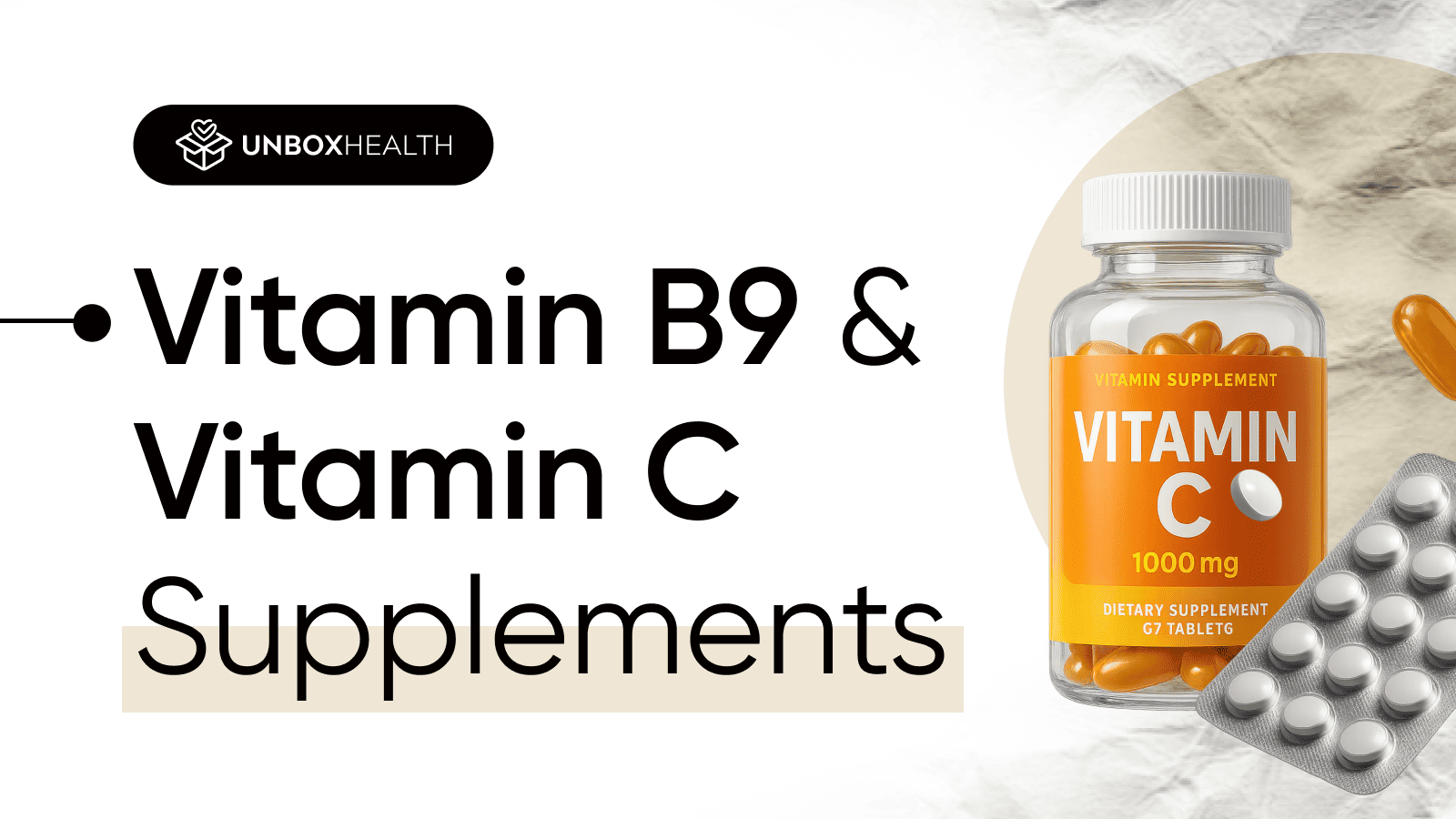When it comes to nutrition, some vitamins shine on their own, but a few work even better as a team. Vitamin B9, also known as folate, and Vitamin C, also called ascorbic acid, are one such pair. Each plays a unique role in keeping us healthy, but together, they help the body absorb, protect, and use nutrients more efficiently.
Let’s explore why these two vitamins make such a powerful duo for overall health, pregnancy, heart care, and beyond.
What Vitamin B9 (Folate) Does
Folate is best known for its role in DNA repair and cell growth. That means it helps every new cell in your body form properly from red blood cells that carry oxygen, to tissues that heal and grow. It’s especially critical for:
- Pregnancy: Adequate folate before and during early pregnancy reduces the risk of neural tube defects in babies (British Journal of Nutrition, 2001).
- Heart and brain health: Folate helps regulate homocysteine, an amino acid linked with higher risk of heart disease and cognitive decline when elevated.
- Energy metabolism: It supports the body in converting food into usable energy by aiding amino acid processing.
The Indian Council of Medical Research (ICMR-NIN, 2024) recommends 400 µg per day for adults, with higher amounts during pregnancy.
What Vitamin C Does
Vitamin C is one of the most recognized nutrients for immunity, but its role goes far beyond fighting colds. It is essential for:
- Collagen production: Vitamin C helps make collagen, the protein that keeps skin firm and supports bones, joints, and blood vessels.
- Iron absorption: It boosts the absorption of non-heme iron (the type found in plant-based foods), making it especially important for vegetarians.
- Antioxidant protection: Vitamin C neutralizes free radicals and regenerates other antioxidants, protecting the body from oxidative stress.
According to ICMR-NIN, adults need 65–80 mg per day, with increased requirements during pregnancy and lactation.
Why Vitamin B9 and Vitamin C Work Better Together
Here’s where the real magic happens: Vitamin C helps protect folate from breaking down, ensuring your body can use it effectively. Think of folate as an important file on your computer and Vitamin C as the antivirus that keeps it safe and functional.
Research shows that:
- Vitamin C prevents folate from being oxidized and lost in the body (BMC Hematology, 2018).
- People who take Vitamin C supplements tend to have higher folate levels in their blood.
- In lab studies, Vitamin C increased the body’s ability to convert folic acid into its active forms, improving DNA synthesis and reducing inactive byproducts (Magana et al., 2020).
- Observational studies suggest that diets high in both folate and Vitamin C are linked with lower risks of certain cancers (British Journal of Nutrition).
This synergy means when you get enough Vitamin C, the folate you consume is more stable, more active, and more effective.
Who Benefits Most from This Combo
While everyone can benefit, certain groups gain particular advantages:
- Women of childbearing age: Folate is critical before and during pregnancy, and Vitamin C makes it more bioavailable.
- Vegetarians and vegans: Vitamin C boosts plant-based iron absorption, while folate supports red blood cell formation.
- People focused on heart and brain health: Folate lowers homocysteine, and Vitamin C protects blood vessels and neurons.
- Those under high stress or pollution exposure: Both vitamins fight oxidative stress and help maintain energy and resilience.
Food and Supplement Sources
You can get both vitamins from food, but many people fall short due to cooking losses, poor diet variety, or increased needs.
- Folate-rich foods: Spinach, lentils, chickpeas, beans, fortified cereals.
- Vitamin C-rich foods: Oranges, guava, amla, strawberries, bell peppers.
Since both are water-soluble and not stored in large amounts, daily intake is important. Supplements are a practical option for people with gaps in diet, higher needs (pregnant women, smokers, or the elderly), or absorption issues.
Practical Supplementation Tips
- Adults: 400 µg folate and 65–80 mg Vitamin C daily.
- Pregnancy: Higher folate needs (consult a doctor); Vitamin C needs also rise slightly.
Both vitamins are safe in moderate supplemental amounts because the body excretes the excess. However, high-dose folic acid can mask Vitamin B12 deficiency, so balance is key.
The Bottom Line
Vitamin B9 and Vitamin C are a synergistic duo. Folate helps build and repair, while Vitamin C protects and activates. Together, they support heart health, pregnancy outcomes, brain function, immunity, and even long-term protection against disease.
If you’re considering supplementation, choose trusted options. At Unbox Health, both Vitamin B9 and Vitamin C supplements have been reviewed and rated, helping you find products that are safe, effective, and clean.
Check out unbiased lab-tested ratings of “Vitamin C and Vitamin B9 Supplements” on Unbox Health along with their detailed lab reports.
About Unbox Health
Unbox Health: India’s First Ratings Platform for Packaged Foods and Health Supplement Tired of biased reviews and never-ending claims? At Unbox Health, every product is tested at multiple premium FSSAI-approved NABL-accredited international labs – 100% independently, transparently, and without any brand involvement.
- 100% Transparency: All lab reports are publicly published.
- Zero Hidden Agendas: Products are market-bought with no brand involvement.
- Accurate Testing: Samples tested at up to 3 premium international labs
- Actionable Ratings: Based on Label Accuracy, Toxicity & Nutritional Profile.
Head over to Unbox Health and let the data guide your consumption choices.
References
- Cell Metabolism (2017). One-carbon metabolism in cell physiology.
- ICMR-NIN (2024). Dietary guidelines for Indians: Vitamin C and folate.
- British Journal of Nutrition (2001). Folate and prevention of neural tube defects.
- BMC Hematology (2018). Vitamin C’s impact on folate stability and homocysteine.
- Magana et al. (2020). Vitamin C activates the folate-mediated one-carbon cycle.
- British Journal of Nutrition, Cambridge University Press. Diet high in folate and Vitamin C linked with reduced carcinoma risk.
